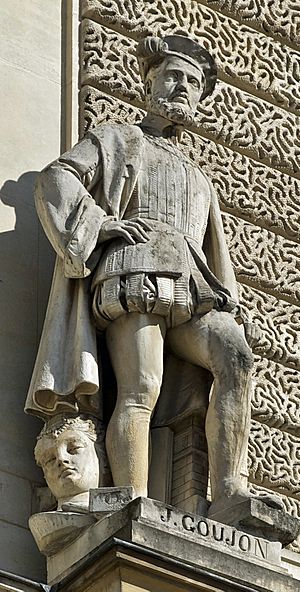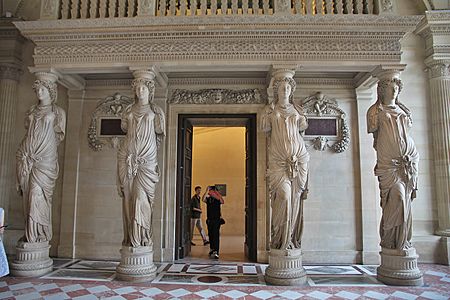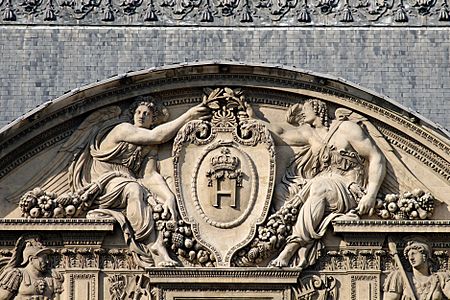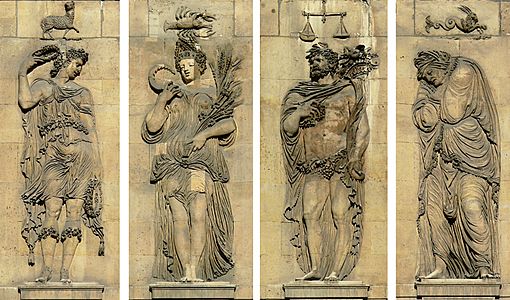Jean Goujon facts for kids
Quick facts for kids
Jean Goujon
|
|
|---|---|

Statue of Jean Goujon by Bernard Seurre, located on the exterior of the Louvre
|
|
| Born | c. 1510 probably Normandy
|
| Died | c. 1565, ~55 years old probably Bologna
|
| Nationality | French |
| Known for | sculptor, architect |
|
Notable work
|
Fountain of the Innocents, Caryatids of the Louvre |
Jean Goujon (around 1510 – around 1565) was a very talented French sculptor and architect. He lived during the exciting time of the Renaissance in France. He is famous for his elegant and flowing sculptures. Many of his best works can be seen in Paris.
Jean Goujon's Life Story
We don't know much about Jean Goujon's early life. He was probably born in a region of France called Normandy. He might have even traveled to Italy to learn from other artists.
His first known works were at the church of Saint-Maclou and the Rouen Cathedral in 1541-1542. There, he created a monument for a nobleman named Louis de Brézé.
Later, Jean Goujon moved to Paris. He worked with a famous architect named Pierre Lescot. Together, they worked on the church of Saint-Germain-l'Auxerrois around 1544. He also did important work at the Château d’Ecouen from 1544 to 1547. This was for a powerful leader named Anne de Montmorency.
In 1547, King Henry II of France made him "sculptor to the king." This was a very important job! For the next few years, he worked on the Château d'Anet. He was briefly held at Ecouen in 1555.
His most famous sculptures were made for the Louvre Palace in Paris. He worked on these from 1555 to 1562, again with Pierre Lescot. Jean Goujon's style is known as Mannerism. His figures look long, graceful, and almost like they are moving. He was very good at carving clothes and fabric, making them look soft and flowing.
Jean Goujon also created drawings for a book by Jean Martin in 1547. He also worked on the Château of Ecouen for the Montmorency family.
In 1562, Jean Goujon left France. He was a Huguenot, which means he was a Protestant. At that time, there were many religious conflicts in France. To stay safe, he moved to Italy. He probably died in Bologna, Italy, around 1565. He was last recorded there in 1563 as part of a group of Huguenot refugees.
His beautiful and graceful style became well-known across France. Many other artists were inspired by his work.
Famous Works
Jean Goujon created many amazing sculptures. Here are some of his most famous ones:
- Fountain of the Innocents (1547–1550)
- Caryatids (1550–1551)
- Allegories on the facade of the Louvre (1549-1555)
- These sculptures can be seen on the outside of the Louvre Palace. They are on the Cour Carrée, which means "square courtyard."
- An allegory is a picture or sculpture that represents an idea, like "War" or "Peace."
- The Four Seasons (around 1547)
- These sculptures were made for a courtyard in Paris. They show the different seasons of the year.
- You can now see them at the Musée Carnavalet in Paris.
Jean Goujon is also believed to have made the drawings for the French version of a book called Songe de Poliphile (1546). These drawings were based on older Italian ones.
For a long time, people thought the famous Fountain of Diana (Diana with a Stag) (around 1549) was made by Goujon. This fountain was for Diane de Poitiers at the Château d'Anet. However, experts now think it was more likely created by another sculptor named Germain Pilon.
Gallery
-
Caryatides, Salle des Caryatides at the Louvre (1550–51)
See also
 In Spanish: Jean Goujon para niños
In Spanish: Jean Goujon para niños
- French art
- French sculpture
 | James Van Der Zee |
 | Alma Thomas |
 | Ellis Wilson |
 | Margaret Taylor-Burroughs |




